Some people in the 11 countries surveyed stand out for their comfort discussing politics in a variety of venues – whether face-to-face, via mobile phone or on social media. In general, those who identify with a political party, younger people and those with higher levels of education tend to be more comfortable discussing political news and issues, regardless of the way in which the discussions take place. But in most countries, more people are comfortable talking about political issues and news face-to-face, rather than digitally.
You can comment on something [on social media] – maybe a product. But politically, there is some fear of posting things. I don’t think we are free to say something politically.WOMAN, 35, KENYA
WOMAN, 35, KENYA
Those who do feel comfortable discussing politics via mobile phone or on social media tend to be more positive about the influence digital technologies have on politics and tend to say social media are a very important source in their lives for acquiring political news and information. People who are comfortable discussing politics on social media are also more likely to say the news they get there is more informative, up to date, reliable and focused on issues they care about compared with other sources.
More prefer in-person conversations about politics to discussions on mobile phones or social media
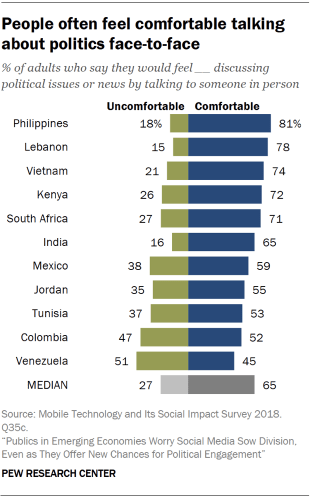
In nearly all of the emerging economies surveyed, more than half of adults say they feel comfortable discussing political issues or news by talking to someone in person. This feeling is most widespread in the Philippines, Lebanon, Vietnam and Kenya, where about three-quarters or more say they would feel comfortable talking about politics face-to-face. The only country where fewer than half say they are comfortable talking about politics in person is Venezuela: 51% say they would not be comfortable discussing politics face-to-face, while 45% say they would be comfortable doing this.
Both politics and religion are controversial to even consider talking [about], so you’d better spare yourself the trouble.WOMAN, 39, MEXICO
WOMAN, 39, MEXICO
In 10 of the 11 countries surveyed, people who are comfortable discussing politics in person are far more likely to describe these discussions as very important for helping them keep up with political news and other world developments. They are also more likely to trust the news and information they get from these face-to-face discussions. In Lebanon, for example, the vast majority (84%) of people who are comfortable talking about politics face-to-face say they trust the information they get from in-person discussions, compared with only 42% of those who say they don’t feel comfortable engaging in such discussions.
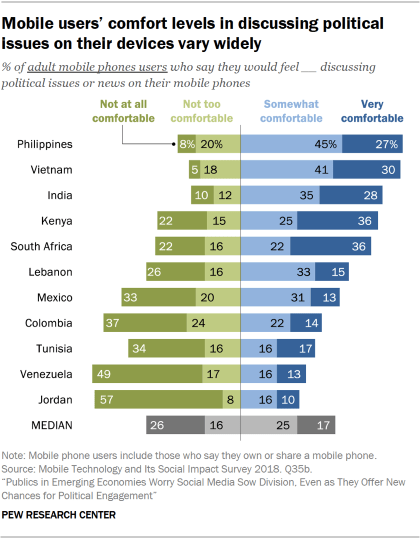
But although majorities of adults in most of the countries surveyed say they feel comfortable discussing politics in face-to-face settings, people are often less likely to feel comfortable talking about these issues on their mobile phones. Across the 11 countries, Filipinos are the most comfortable with using their mobile phones to discuss political issues: 72% of Filipino mobile phone users say they’d be comfortable doing so, including around a quarter who would be very comfortable.
Majorities of mobile users also say they would be comfortable discussing politics on their phone in Vietnam, India, Kenya and South Africa. Other publics stand out for their apprehension in using mobile phones to discuss political issues or news. Majorities of mobile users in Venezuela, Jordan and Colombia say they would be uncomfortable talking about politics with someone via mobile phone, with Jordanians feeling particularly strongly: A majority of the country’s mobile users (57%) say they would be not at all comfortable discussing politics on their phones. About half of Venezuelan mobile users (49%) also say they would not feel comfortable at all discussing politics via mobile device.
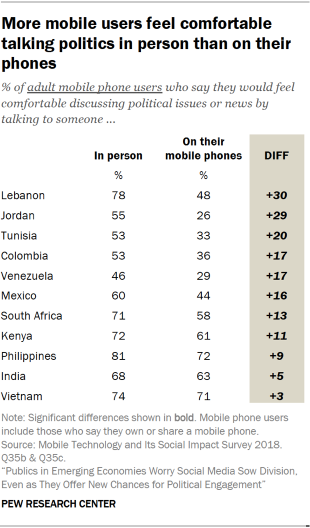
In every emerging economy surveyed, mobile phone users are more likely to say they would be comfortable talking about politics in person than on their mobile phones. In Lebanon, for example, a majority of mobile users (78%) say they would be comfortable talking about politics with someone in person, but only about half (48%) say they would be comfortable doing so on their mobile phones. In nearby Jordan, a similarly large gap is seen.
In 10 of the 11 countries surveyed, people who are comfortable discussing politics on their mobile phones are more likely to say mobile phones have had a good influence on politics. In the Philippines, for example, a majority of mobile users who are comfortable discussing politics on their phone (57%) say these devices have had a good influence on politics, compared with just 42% of those who are uncomfortable talking about politics on their phone.
Substantial variation across countries in people’s willingness to discuss political topics on social media
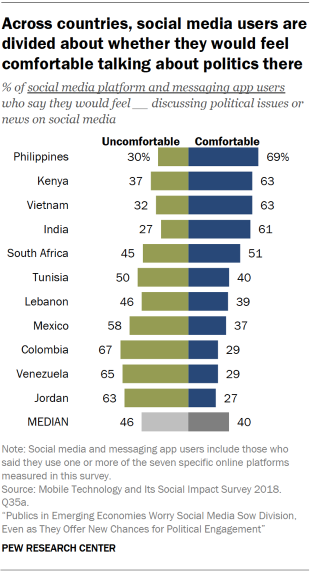
Jordanians, Venezuelans and Colombians – who are the most likely to feel uncomfortable talking about politics on mobile phones – also stand out for their hesitancy to discuss politics on digital platforms. More than six-in-ten social media users in these countries say they would not be comfortable discussing politics on social media. A majority of Mexican users (58%) also say they would be uncomfortable discussing political news and issues on social media. Users in South Africa, Tunisia and Lebanon are somewhat divided over whether they would be comfortable discussing politics on social media platforms.
As was the case with mobile phones, social media users are more likely to say they would feel comfortable discussing politics face-to-face than on social media. For example, 78% of Lebanese social media users say they would be comfortable talking about political issues with someone in person, but just 39% say they would be comfortable doing this on social media.
If you express your political opinion on social media, it could impact your work life. You might get in trouble for that. That’s why we prefer to remain neutral.WOMAN, 29, TUNISIA
WOMAN, 29, TUNISIA
People who are comfortable talking about politics on social media tend to feel more positively about the internet’s impact on politics more broadly in nine of the 11 countries surveyed. And no matter the medium of conversation – face-to-face, mobile phone or social media – people who identify with a political party, younger people and those with higher levels of education tend to feel more comfortable discussing political news and issues (see Appendix C for detailed tables).78 Meanwhile, men in Colombia, Mexico, South Africa and Venezuela report feeling more comfortable talking about politics than women, regardless of the setting.
Majorities have not been surprised by someone’s political views on social media or blocked a person for political reasons
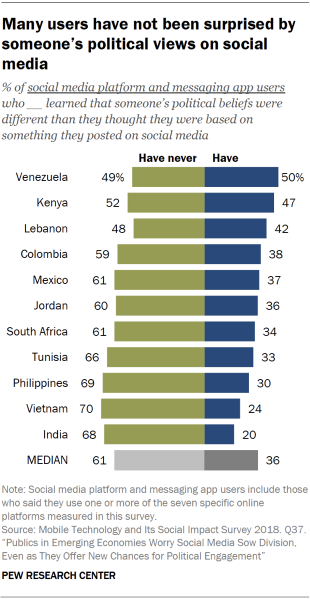
In most countries, a minority of social media and messaging app users say they have learned that someone’s political beliefs were different than they originally thought because of something that person posted to social media. Venezuelans and Kenyans stand out as the two publics where around half of social media users say they have learned someone’s political beliefs are different than they originally assumed. By comparison, a 2016 survey of U.S. adults found that half of social media users had been surprised by someone’s political views based on their social media posts.
More-educated social media users are more likely to say they have been surprised by someone’s political views on social media. To a lesser degree, age and gender play a role in some countries; younger social media users and male users are more likely to have been surprised.
And in Colombia, India, South Africa, Lebanon and Tunisia, people with partisan identifications are more likely than those who say no party represents them to say they have been surprised by someone’s political views on social media. In six of the 11 countries, people who are comfortable engaging in political discussions on social media are also more likely to have been surprised by someone’s beliefs.
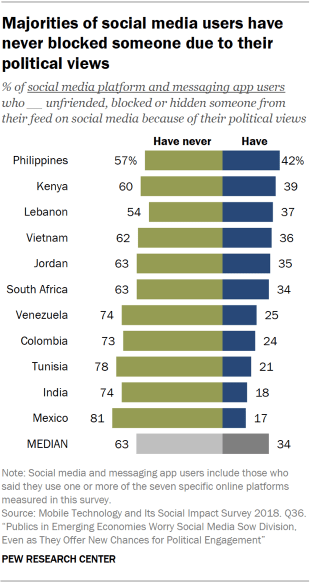
Meanwhile, modest shares of social media and messaging app users (median of 34%) say they have unfriended, blocked or hidden someone from their social media feed because of their political views. Blocking another social media user because of his or her political views is most common in the Philippines (42% of users) – the country where users are most likely to say they feel comfortable discussing politics via social media. And in every country surveyed, people who say they’ve been surprised by someone’s political views on social media are more likely to have blocked someone. In Jordan, Lebanon, the Philippines and South Africa, younger social media users (ages 18 to 29) are more likely than users 50 and older to have blocked someone because of their political views. In five of the countries surveyed – and particularly in Jordan (by 18 percentage points) – male social media users are more likely to have blocked people than female users. But in most countries, partisans are no more likely than nonpartisans to have blocked someone.
One of my colleagues at work shouted at me when I expressed my opinion. He deleted me from Facebook because we do not have the same mentality.WOMAN, 45, TUNISIA
WOMAN, 45, TUNISIA




